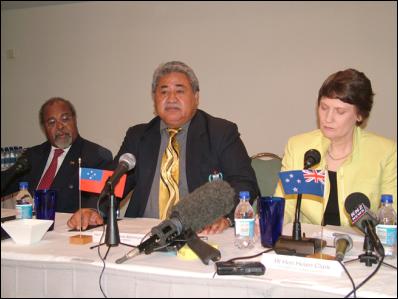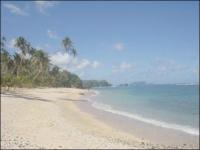Regionalism Yes - Federalism Going Too Far Says PM
Pacific Regionalism Yes - Federalism Going Too Far Says PM
Pacific Leaders Advance United Regionalised Plan
By Selwyn Manning - Scoop Co-Editor
The leaders of New Zealand, Samoa, Papua New Guinea, Marshall Islands and the Pacific Forum secretary general met in Auckland on Wednesday (March 23 2005) to advance a unified pact where Pacific nations will work together to speak with one voice.
Are we witnessing the beginning of a Pacific economic common union or a united federation of Pacific nations?

From left: Papua New Guinea PM
Sir Michael Somare, Samoa PM Tuilaepa Sailele Malielegaoi,
and NZ PM Helen Clark.
Federalism? "That would be too strong," said New Zealand's Prime Minister Helen Clark: "It is regionalism not federalism."
But Helen Clark said there is a critical point: "We are talking about a region protecting itself in a way it has not done so before: setting priorities which are cross country, are regional priorities.
 "I think it is important also to connect
it with some of the developments that are going on
internationally where increasingly the UN is looking for the
emergence of strong regions which are identifying their
needs, their priorities, how they are going to work
together, how they will deal with issues which arise in
their own backyard. And that is something that will be very
much to the fore in discussions of a high-level panel summit
at the UN in September."
"I think it is important also to connect
it with some of the developments that are going on
internationally where increasingly the UN is looking for the
emergence of strong regions which are identifying their
needs, their priorities, how they are going to work
together, how they will deal with issues which arise in
their own backyard. And that is something that will be very
much to the fore in discussions of a high-level panel summit
at the UN in September."
The United Nations, Helen Clark said, now prefers to deal with regionalised blocks of nations. The Pacific Plan is designed to meet this, to pull all the nations of the Pacific into one regionalised identity that will collect together skilled people to work co-operatively to solve the region's problems and challenges, and, advance the region's opportunity in trade.
Development is proceeding very fast in other regions of the world: "The Pacific must not drift back, we need momentum, we need traction and I think it is this sense of immediacy, the need for action, that will be the greatest challenge," Helen Clark said.
Pacific Plan a Pragmatic Necessity?
 Clearly, for example, it is virtually
impossible for a tiny nation like Nauru to foot it with
Samoa, or Fiji, in averting a looming financial collapse -
in Nauru's case, resulting from its phosphate resource
having been exploited and exhausted.
Clearly, for example, it is virtually
impossible for a tiny nation like Nauru to foot it with
Samoa, or Fiji, in averting a looming financial collapse -
in Nauru's case, resulting from its phosphate resource
having been exploited and exhausted.
Likewise, it is impossible for Fiji to adequately address security in its sector of the Pacific without the skills and technical expertise of Australia and New Zealand's military surveillance, policing intelligence and training being shared.
The Pacific Plan will eventually identify and prioritise the exact issues impacting on small nations and the region as a whole and will pull together a co-operative to ensure the issues are addressed.
For example, let's consider Tokelau's right to harness ownership and control over tuna stocks in its waters: without a regionalised body operating in its national interest, Tokelau would be powerless against Japan's and the United States' tuna-industries exhausting its natural resource.
So when one provides context to vague references such as natural resource management - one can see (in the mind's eye) the Pacific Plan taking shape.
From a legal perspective, frameworks that have been implemented within New Zealand and Australian law can be adapted and adopted to address a broader regionalised plan to co-ordinate fishing stocks and other natural resources essential to respective and individual Pacific islands - such frameworks can also be scaled down to a micro level to provide the necessary guidelines that will ensure protection for small island nations from experiencing that which has befallen Nauru.
Additionally, security, communications, resource management, and region-wide economic stability are the big ticket items on the Pacific Plan agenda.
The Pacific Plan
has three stages:
What can be done (short term) in
the first three years, (medium term) in the three to five
years, and (longer term) what would the region's nations
like the Pacific to look like in ten years.
The key to this grand regional plan is money. And the Pacific needs outside funds from "donor" bodies like the European Union and United Nations and its various agencies.
Historically, individual Pacific nations have bilaterally entered into agreements with donor bodies. The EU has talked to Samoa, to Fiji, to Papua New Guinea, Marshall Islands.
The success or otherwise has been uncoordinated and spasmodic.
 As
mentioned earlier, both the European Union and the United
Nations clearly now prefer to deal with single point world
regional representatives. "Now the region is saying;
'actually we have got a regional plan which is identifying
some priorities'," Helen Clark said.
As
mentioned earlier, both the European Union and the United
Nations clearly now prefer to deal with single point world
regional representatives. "Now the region is saying;
'actually we have got a regional plan which is identifying
some priorities'," Helen Clark said.
And that's where Greg Urwin comes in. He is charged with being the diplomatic face of the Pacific region and keeping the UN and EU engaged and aware of the vision that is emerging from the Pacific. He said these donor bodies are being kept informed about developments and priorities as set by the leaders and acted on by the taskforce.
Promise Of Detail At PNG Forum 2005:
Discussions this week took place on whether Pacific nations ought to establish Cabinet sub-committees tasked to look at the Pacific Plan and its implications for respective countries: "So there is going to need to be national action as well as regional action," Helen Clark said and added that this week's meeting gave "political impetus" for the Pacific Islands Forum (PIF) taskforce to identify practical steps forward. Again, Greg Urwin's job is to work out who does it, when does it get done, and how it is accomplished.
Again what "it" is remains difficult to tie down. An example of an "it" is the spread of HIV/AIDS infection across the Pacific.
Helen Clark said nothing "in depth on issues" was discussed at this week's meeting: "But what we have done is look through the things that have been identified… we agree on this list, now what we want our officials to go away and do is see how much of this could actually be done in say the first three years, and identify the carrying of that task forward. We agreed that these are issues that should be tackled under the Plan," Helen Clark said.
What is clear is the leaders have identified four areas of activity where priorities will be set.
They are:
Economic growth - which prioritises areas such as a digital strategy (Helen Clark: "Regions are going nowhere unless they are hooked into digital communication… and digital communication offers great potential and opportunity… and in a way can overcome any regional geographical marginalisation") - vocational and skills training which analyses to what extent Pacific nations need to pool resources, Pacific regional marketing with an emphasis on tourism, and issues on trade agreements and trade facilitation including quarantine standards at island ports. Sustainable development - big issues around the environment waste management, resource management, regional health initiatives. Good governance - this Helen Clark says has come "right to the fore" for donors (the European Union) and is also a priority within the region itself. Security - co-ordination of maritime security and surveillance. "If a port is not secure is that going to put off foreign shippers from coming and providing the vital transport?" Helen Clark said.
Until now, the Pacific Plan (mfat.govt.nz) has presented as a vague mind-conceptual programme cloaked in mission statements and geo-official-speak. It had almost become impossible to distil an understanding of what it was all about - largely due to a lack of tangible specifics.
For example the Pacific Plan discussed how to pool scarce regional resources and strengthen economic growth, sustainable development, good governance (a phrase turned into a mantra, but not practise, by former New Zealand prime minister Jenny Shipley), and security. But it does not and has not attempted to explain how it will achieve its goals.
Greg Urwin said it is premature to expect otherwise as it is at the national development stage - meaning detail is kept up one's diplomatic sleeve.
The outcome of the Auckland meeting was similar to the above, with one exception: a clear expectation was highlighted that the Pacific region would begin to speak with one voice to other regions of the world.
The Pacific Plan was first heralded at the Pacific Islands Forum in Auckland in 2003, and further advanced as a concept in Apia, Samoa, in August 2004.
"What drove the idea of developing a Pacific Plan was the concern that within the 21st century as globalisation and technological change speeds up, unless development speeds up in the Pacific then the Pacific can end up drifting further behind. The issue was how to begin bringing into a sharp focus new areas of co-operation, new priorities for development that can take the Pacific ahead," Helen Clark said.


 DC Harding: In The Spirit Of Natural Justice
DC Harding: In The Spirit Of Natural Justice Martin LeFevre - Meditations: Animal Encounters During Meditative States
Martin LeFevre - Meditations: Animal Encounters During Meditative States Ian Powell: Gisborne Hospital Senior Doctors Strike Highlights Important Health System Issues
Ian Powell: Gisborne Hospital Senior Doctors Strike Highlights Important Health System Issues Keith Rankin: Who, Neither Politician Nor Monarch, Executed 100,000 Civilians In A Single Night?
Keith Rankin: Who, Neither Politician Nor Monarch, Executed 100,000 Civilians In A Single Night? Eugene Doyle: Writing In The Time Of Genocide
Eugene Doyle: Writing In The Time Of Genocide Gordon Campbell: On Wealth Taxes And Capital Flight
Gordon Campbell: On Wealth Taxes And Capital Flight